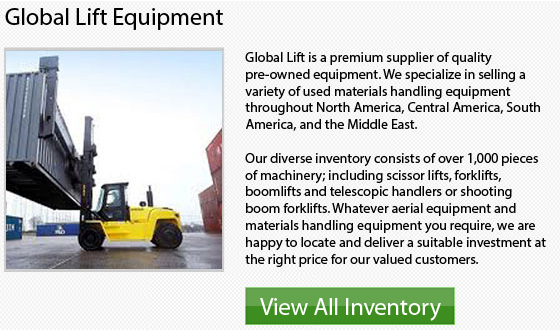
Classifications of Aerial Lift Platforms & Scissor Lifts
Scissor lifts consist of a series of crisscrossed steel arms, connected to make an X pattern. When the crisscrossed arms are extended, the platform is raised vertically. There are support railings along the edges of the lifting mechanism to be able to keep the employees safe and help to secure their tools.
The scissor lift has a low profile, best suited for smooth surfaces like hard dirt surfaces, concrete and pavement. These machines use either an electric motor or a combustion engine in order to power the lifting mechanism and move the lift. The operator would have to move the lift itself if she or he needs to travel horizontally, because the lift mechanism only operates the lift vertically.
Rough Terrain Scissor Lift
The rough terrain scissor lift and the standard scissor lift utilize identical lifting technology. The key difference is that the rough terrain units feature a different base that is specifically made for uneven surfaces. These units also provide oversized all terrain tires and higher ground clearance. The rough terrain scissor lifts utilize 4-wheel drive in order to easily navigate through muddy and difficult terrain.
Telescopic Boom Lift
The telescopic boom lift utilizes a telescoping beam which raises both diagonally and vertically. This unit has a small work platform that houses controls in order to operate the boom. The controls work with a combustion engine in order to power the hydraulics which move the lift and power the boom. The telescopic boom lift is an independent lift unit and has off-road capable tires.
Articulating Boom Lift
The articulating boom lift features 2 telescopic booms that are connected with a moving elbow mechanism. This lifting machinery has a small work platform or a bucket that is equipped with hand controls to be able to control the boom. These are stand-alone lifts that are powered by a combustion engine. Articulating boom lifts are offered with either off-road or hard surface tires. These lifts are made in order to reach over top of and on top of buildings.
Aerial Mast Lift
The aerial mast lift uses a telescopic mast in order to lift a work platform vertically into the air. Typically, these lifts are electrically powered or pneumatic powered and are self-propelled equipment. These machinery provide an ideal solution for working in high racks in narrow warehouse aisles. It is essential to note that aerial mast lifts are not recommended for off-road application and are limited to vertical movement.